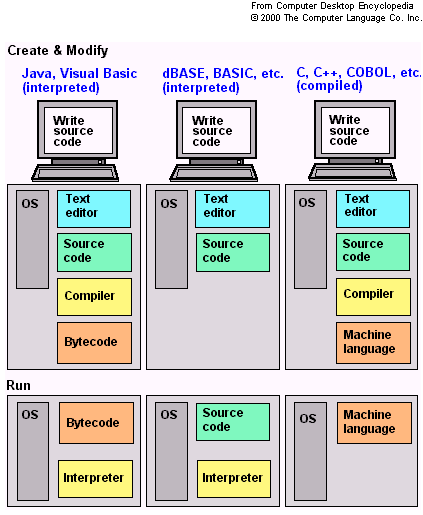Interpreters Compilers Software For Mac
Operating System: Mac OS. X 10.7 aka 'Lion' Support Status: July 19, 2011 Intel Fortran Composer XE 2011 for Mac OS.
X and the Intel C Composer XE 2011 for Mac OS. X do not officially support use under Mac OS. X 10.7 'Lion'. This also applies to official support for integration into Xcode 4.1 - this configuration is not supported at this time. At this time Intel does not officially support use under Mac OS. X 10.7 and/or integration into Xcode. 4.1.
Antivirus Software For Mac
Compilers versions 11.1 and older are known to NOT work under Lion, and these older compilers will not be updated to work for Lion. A future update of the 12.x compiler will support Lion, but the currently released 12.0 Update 4 also does NOT support Lion. Do not upgrade to Lion if you need a working Intel compiler until we officially support Lion. Official Intel compiler support for Lion will occur sometime after official release of Lion by Apple, whenever that may be. Typically, Intel attempts to have a compiler update or release to support a major Mac OS.

X release within 3 months or less of official launch. Intel will alert customers to official support in the Release Notes of a compiler update or major release along with notices on our User Forums: C User Forum: Fortran Linux/Mac User Forum: While official support is currently not available, users may find that their existing Intel compilers for Mac OS X may or may not work as expected in this environment. We do begin early testing during beta phases of Lion and will attempt to make our compilers compatible as soon as possible after official release. Official support will follow official release of Lion and sufficient time to qualify our compilers under the officially released OS, and must synchronize with our internal release schedules for the compilers. Again, typically this is 3 months or less after official OS release. Fortran Note: The Intel Fortran compiler integration into Xcode is a 'Limited Feature', meaning that not all functionality within Xcode is available to Fortran users. In particular, module dependencies are not detected and not respected: a user must manually compile modules in dependency sequence.
Also, the built-in Xcode debugger is not Fortran language aware, making debug rudimentary and problematic. These and other current 'Limited Feature' Fortran integrations into Xcode are also expected in the integration into Xcode 4.1. This does not apply to users of Intel C for Mac OS X. ADDITIONAL INFORMATION: For a complete list of support resources, Forum, Downloads, Licensing, and other resources for Intel Fortran Compiler for Mac OS. X, visit our Knowledge Base here: For a complete list of support resources, Forum, Downloads, Licensing, and other resources for Intel C/C Compiler for Mac OS.

X, visit our Knowledge Base here: DISCLAIMER: The information on this web site is intended for hardware system manufacturers and software developers. Intel does not warrant the accuracy, completeness or utility of any information on this site. Intel may make changes to the information or the site at any time without notice. Intel makes no commitment to update the information at this site.
ALL INFORMATION PROVIDED ON THIS WEBSITE IS PROVIDED 'as is' without any express, implied, or statutory warranty of any kind including but not limited to warranties of merchantability, non-infringement of intellectual property, or fitness for any particular purpose. Independent companies manufacture the third-party products that are mentioned on this site. Intel is not responsible for the quality or performance of third-party products and makes no representation or warranty regarding such products. The third-party supplier remains solely responsible for the design, manufacture, sale and functionality of its products. Intel and the Intel logo are trademarks or registered trademarks of Intel Corporation or its subsidiaries in the United States and other countries.Other names and brands may be claimed as the property of others.
I found two problems. 1) Apple moved the g compiler. There is a help page about that. You provide the path to the compiler. The link to the page is: If you follow the instructions at the bottom of the page the compiler works to compile. 2) My problem is that the link step fails.
Ifort is looking for libctr0.10.6.o. Maybe Klaus's trick will help for that, I didn't try it yet.
A comment to Ron. What you say is 100% correct. But people using ifort are developing code and can be expected to be tolerant of complexity and the odd kludgy thing. So when there is a new OS version that messes stuff up it is a big help to have a pointer or two to patch over the problem until the definitive solution can be made available. The goal is to help your customers avoid being dead in the water. Just my 2 cents.
Klaus, the best way to make a compiler's generated object files and executables compatible with an OS of any kind is to use the linker and libraries of that OS. It's that simple - you want to be compatible, use the system provided linkers, librarian utilities and libraries.
Don't fall for easy (but wrong) assumptions or conspiracy theories. As for official support of Mac OS versions: For official support we have to wait for an OS to have an OFFICIAL release. Yes, we start testing with beta versions, BUT OS vendors often throw in a surprise between last beta version and released version of the OS. So never never never bet that the beta version will match what they release, you will get burned.
So after an OS releases, we replace our beta versions and then have to run the next update through a full QA and PV cycle to make sure there are no surprises. Our updates come out on a 3 month cycle roughly, so that is the ceiling function on when you will see support.